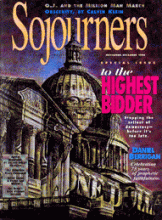THE RACE for the 1996 Republican presidential nomination has turned into a scramble for the support of conservative Christians. This scramble was prefaced by the no-show of the coalition's favorite son, former Vice President Dan Quayle, who announced in February that he would not make the race because of a lack of financial support. "Quayle's departure from the race creates the equivalent of a jump ball at the buzzer," Reed was quoted as saying by The Charlotte
(N.C.) Observer
. "The question is who will jump highest to get that vote," Reed said.
One of the candidates who is jumping high is Senate Majority Leader Bob Dole. Early in the 1994 election cycle, Dole refused to endorse the senate bid of Oliver North, the Reagan administration official. After a call from Robertson, Dole changed his mind. "It so frightened...Dole...that four days after expressing doubts about Oliver North as a Senate candidate in Virginia he ate his words, endorsed Mr. North and gave him $5,000 in PAC money," Anthony Lewis wrote in The New York Times
. Dole's high-profile right turns on several issues is indicative of the coalition's power.
During the coalition's 1995 annual convention in September, all candidates for the GOP nomination were invited to speak to the group, with one exception. (The exception was Sen. Arlen Specter of Pennsylvania, who is pro-choice on abortion and a critic of the coalition's growing power within the GOP.) Critics termed the parade of presidential hopefuls as a "panderfest." Dole led the way saying, "I read in this morning's papers about how all these candidates were coming down here to court all of you. Well, maybe we are. What's wrong with that?"
Since his failed 1988 attempt at elective office, Robertson has succeeded in positioning himself to benefit from two monumental revolutions, one in telecommunications and the other in politics. He now stands as a giant in both realms.
Read the Full Article

